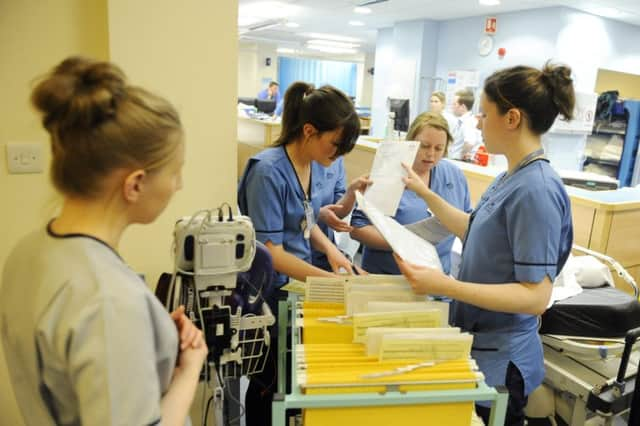Call for action on NHS ‘crisis’ as stress and anxiety-related absences among staff soar


More than 3.5 million working hours have been lost in the NHS through stress or mental health problems, according to figures obtained by Scottish Labour through Freedom of Information laws.
First Minister Nicola Sturgeon admitted the was an “incredibly difficult” place to work at times, but insisted it remains the best performing health service in the UK The statistics show 3,507,294 hours were lost 2018-19, accounting for 24.7 per cent of all NHS absences last year. The figures have been steadily rising since 2014.15 when 16.3 per cent of NHS staff were absent due to mental health issues.
Advertisement
Hide AdAdvertisement
Hide AdLabour leader Richard Leonard said concerns the NHS workforce is “facing staff burnout”, which ad been raised by trade union and professional bodies, prompted the party’s FOI request.
At First Minister’s Questions yesterday, Mr Leonard said: “These workers are being let down. In the end, patients suffer too. The treatment time guarantee breached over 230,000 times, delayed discharges from hospital up 6 per cent last year alone, 20,000 more people left waiting in A&E for over four hours. That’s up by 17 per cent.
“The SNP has been running Scotland’s health service for more than 12 years and today the human cost of patients and NHS staff is plain to see.”
He told Ms Sturgeon: “This health crisis has blown up under your watch. It’s your responsibility.”
It comes after a report by Audit Scotland last week warned that the NHS is “running too hot”, putting pressure on staff. With an election just six weeks away, Mr Leonard pledged that a Labour government would make investment in the NHS a key priority.
He added: “What does Scotland’s National Health Service need? Another decade of cuts, prescribed by your own blueprint for independence. Or the £70 billion of investment in our public services that would result from the election of a Labour government?”
The SNP leader said the NHS is treating more patients than ever and defended her party’s record.
“I think the NHS is an incredibly difficult place for NHS staff to work,” Ms Sturgeon said. “I think that has always been the case as we see demand on our NHS rising that is even more the case now.
Advertisement
Hide AdAdvertisement
Hide Ad“I was struck by the Audit Scotland report just last week which recognised that the NHS was seeing and treating more patients than ever before.” Ms Sturgeon added: “We will continue to support those who work in the NHS. Sickness absences in the NHS fluctuate, but they have remained fairly stable in the last few years.
“There are more people working in our National Health Service now than there were when this government took office.”
The NHS budget north of the Border has also been rising in recent years and the work being done by the Scottish Government on the NHS is resulting in improved performance, Ms Sturgeon added.
She said: “It’s only because there is an SNP government in Scotland today that this NHS is the best performing in the UK.
“We will continue, in tough times for the NHS ... to support our front-line staff in the essential work that they do.”
The First Minister also claimed that if the Scottish Labour Party had won the 2016 Holyrood election, the NHS would be £758 million worse off in this financial year.
She added: “This government will stand by our NHS staff, I’m not sure Labour would have.”
Scotland’s Auditor General Caroline Gardner said in a report last week that staff were under intense pressure and the integration of health and social care was too slow.
Advertisement
Hide AdAdvertisement
Hide AdThe report said there could be a £1.8bn shortfall in the projected funding.
“We can’t just buy our way out of this,” the auditor general said. “The pressures are getting more and more severe every year. That puts a lot of pressure on people working in the health service and it also damages confidence.”